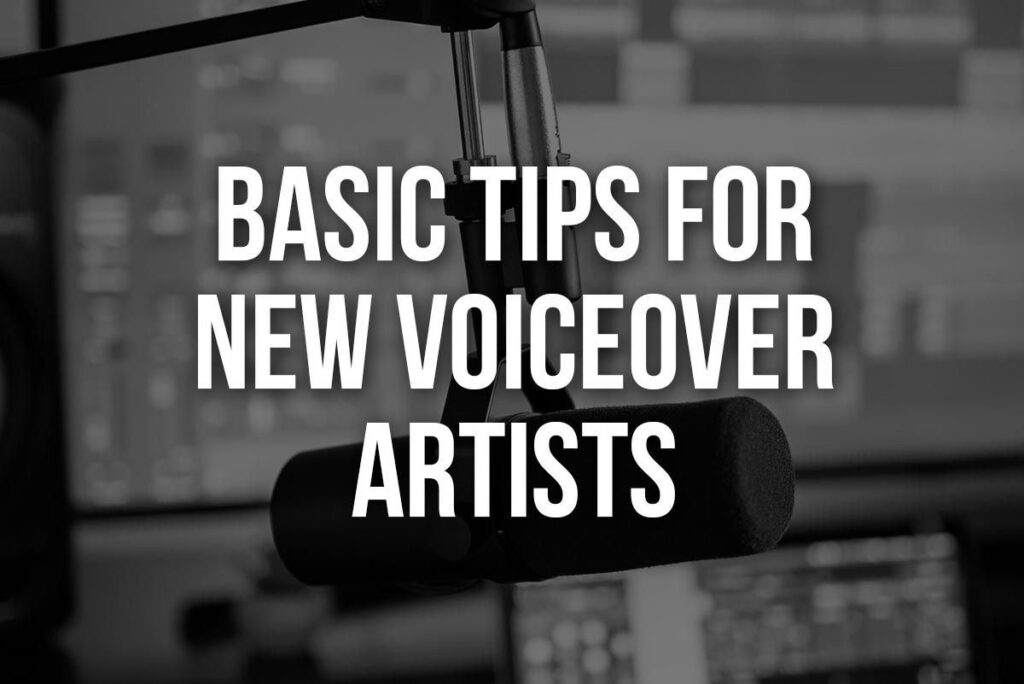Contents
Introduction
Voiceover work is sometimes regarded as a complex thing. From online advertisements to TV ads, YouTube videos to corporate training sessions, radio voices to movie dubbing, voice acting is everywhere. You can make money using your voice fairly easily. You don’t even need to have a ‘radio voice’ to work in the industry. There is no doubt that voice acting is an exciting career. With these 8 tips for new voiceover artists, you’re more than likely to succeed in the business.
Technology has changed everything today. Twenty years ago, voice actors had to work in large recording studios in big cities. But now most voice actors have a mini-studio and record work from their homes.
It can be difficult for beginners to thrive in a competitive voice acting industry as a good voice is not enough to flourish. In addition, you need to keep in mind that there are some essential tips for the new voiceover artists out there. Here are 8 tips for new voiceover artists…
Basic Tips for Voice Recording
Know your basic vocal techniques
Practice the various elements of speech. Each word you speak should be appropriately pronounced and impeccable so that the listener can understand it clearly. It would be best to be consistent with your volume, energy, pacing, tone, and articulation in your voiceovers. Do not mumble, over-enunciate, and make sure to follow the regional accent for where your voiceover will be used. Moreover, speaking and reading at a conversational speed keeps the listener engaged. Record some practice scripts so you can listen back and critique yourself.
Know your vocal traits
The sonic traits and enunciation of an individual are influenced by breathing intervals, tongue strength, jaw relaxation, and yawning. Don’t restrict your breath; it’s the energy that drives your voice. Speak from your chest rather than your throat. With your tongue and jaw, do various vocal warm-ups and breathing exercises repeatedly. Keep your jaws relaxed so that you have plenty of room in your mouth for the tongue to move quickly. Yawning is another voice exercise you can do, as it reduces contraction in the throat. Your body is the carry case of your voice so maintain good posture too.
Water is everything

Keep yourself well hydrated for good vocal health. Water is a natural lubricant for your vocal cords and your whole body. Take regular breaks to have a sip of water between voiceovers. Warm drinks also contribute to a good voiceover. Also, make sure to practice gargling with salt to reduce inflammation. Avoid drinking too much alcohol as it can drain your vocal cords, making you sound hoarse and tired. Your throat’s mucous membranes can also be affected, limiting the range and control of your voice. In short, every time you step into the studio you should have a glass of water!
Optimize your recording environment
The room that you choose for recording has a significant impact on your voiceover. A large room makes you sound distant and can be hard to understand, whereas a small one has a louder echo. Pick a room that has soft and small furnishings to minimize the ambiance of the room. Use acoustic foam if necessary, to ensure clarity while recording. I recommend these foam panels on Amazon. The foam traps the sound waves inside its many micro-holes and prevents some of the sound from leaving the foam, therefore reducing the amount of reflection that reaches the microphone.
Know your audio equipment
Make sure you put the microphone in the right place. Too close to your mouth and your recording will be full of mouth noises and will sound just gross. Too far away and you’ll pick up more room reflections. You also want to know how the microphone colors your voice. Once you know that, you can create some EQ presets for different types of deliveries.
Pop filters are pretty much required on nearly all mics. A select few mics have built-in pop filters (like the Electrovoice RE20 (Amazon), RE320 (Amazon), and RE27ND) but you’ll need a pop filter for every condenser microphone. Keep your distance uniform during your takes so the volume level is consistent. Some variation is okay and can be fixed with a compressor.
Study the script/character
Learn the material or script thoroughly. An initial read gives the idea of the content, but go ahead and practice reading through the script. You can begin with a first read without recording it in order to get into the mood of the script. Rehearse aloud to add some emotion and excitement to the reading when necessary. It also identifies any trouble words or phrases. Also, find out all you can about your character if your voice represents a particular character in the script, to really fit the character and get an incredible performance from your end. Make sure you have a copy of the script and makes notes on it.
Coaching and Listening
Learning sessions with a voice acting coach helps refine your voiceover abilities, making you a more bold and professional performer. A voice acting coach can improve your technical skills like breathing, pronunciation, and tonality to perform each line as best as possible. Practice watching videos, TV shows, and documentaries to study your favourite professional voice actor’s work. Listen to these actors and take notes on how they vary their tone and accents. You can even listen to voice acting podcasts to get tips on how expert voice actors approach specific roles.
Practice and Practice
Don’t stop practicing! Practice speaking out loud as it helps with punctuation, intonation, and coordination. It’s a smart idea to practice even when you’re not in a professional recording studio. Once you’re in the studio, practice reading the script and listen back to your recordings. Practice helps you develop a professional-sounding voice that will appeal to casting directors, audiences, and marketing professionals.
CONCLUSION
It is of no doubt that any mistake in voice-over production can cause trouble both during and after the recording. Voiceover defines the personality and identity of your video. Voiceover makes videos lively and attractive, providing them with a particular portrayal of mood, feeling, authority, and credibility. If you’re a beginner, keep in mind these voiceover tips and start recording. If you choose to, you can become a voiceover actor, and most importantly – never give up!


This helps a lot as I am a starter.
Glad you enjoyed it! You’ll do great with your voiceovers!